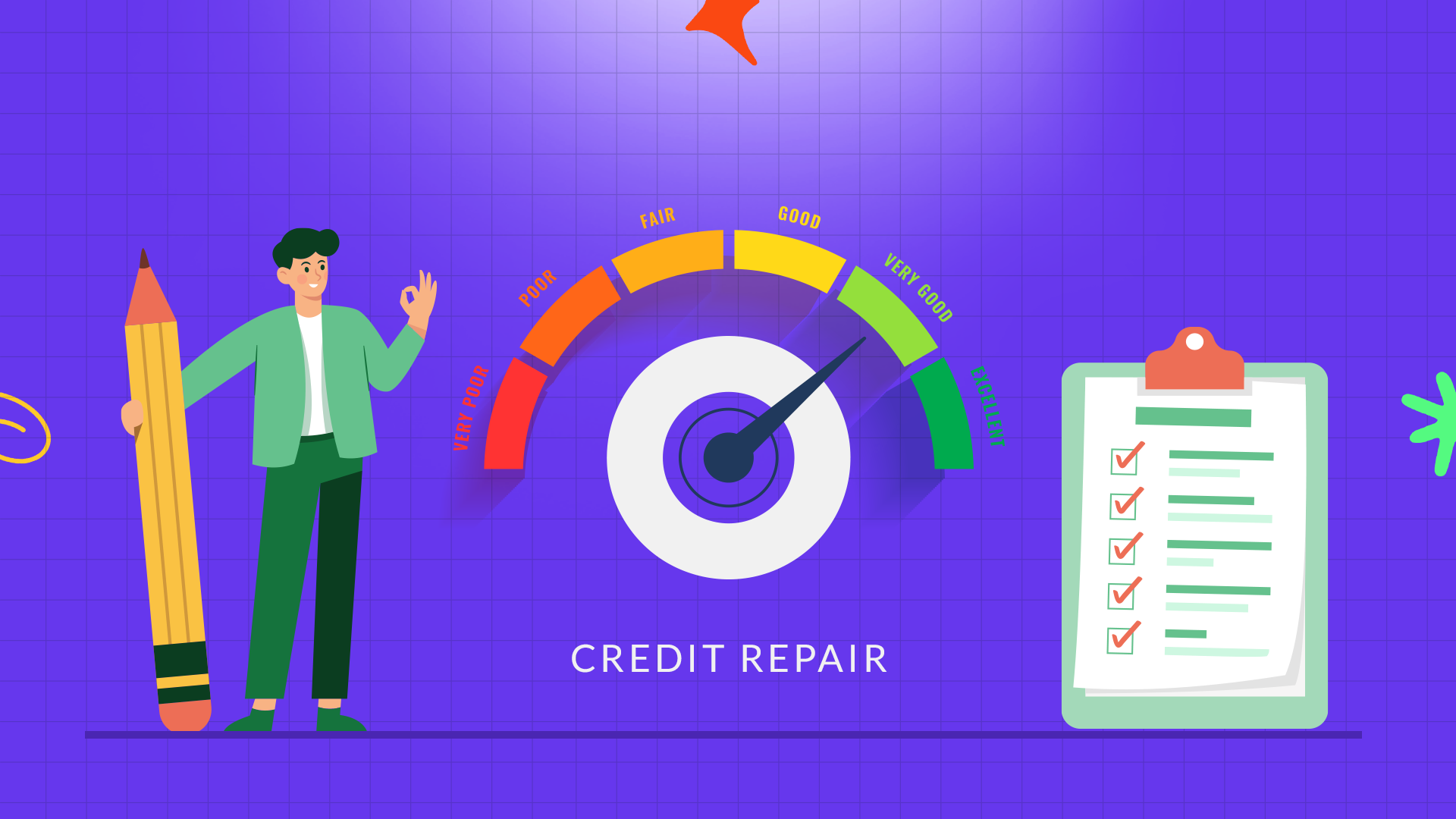Rebuild Your Credit From Scratch: The Ultimate Guide to Fixing Your Credit Score
Tired of being denied? Learn the exact steps to fix your credit score fast, even if you’ve hit rock bottom. No fluff. Just what works.

Your credit score is more than just a number; it’s a key factor in determining your financial opportunities. Whether you’re looking to buy a house, get approved for a secured credit card, or secure a lower interest rate, your credit health matters. But what happens when your credit score takes a hit? That’s where credit repair comes in.
At Credit Veto, we understand how overwhelming credit issues can be. That’s why we’re here to provide a step-by-step guide on how to repair your credit, remove negative items from your credit report, and improve your financial standing (start our 7-day free trial).
In this guide, you’ll learn everything you need to know about credit repair, from understanding credit reports to disputing inaccuracies and building a stronger credit profile for the future.
Why Your Credit Score Matters
Your credit score is your ticket to financial freedom for the following reasons.
1. Loan Approvals: Your Ticket to Borrowing Power
When you apply for a mortgage, car loan, or personal loan, lenders check your credit score to determine if you’re a reliable borrower. A high score signals that you have a history of repaying debts on time, increasing your chances of approval. On the other hand, a low credit score can result in loan denials or require you to provide a co-signer or additional collateral.
2. Interest Rates: The Cost of Borrowing Money
Even if you get approved for a loan, your credit score directly affects how much you’ll pay in interest. Borrowers with excellent credit scores qualify for lower interest rates, meaning they pay less over time. For example, a higher score could save you thousands of dollars on a mortgage or car loan, while a lower score results in higher interest payments, making borrowing more expensive.
3. Credit Card Approvals and Limits
Credit card issuers evaluate your credit score before approving applications. A strong credit score not only increases your chances of getting approved for a credit card but also qualifies you for higher credit limits and better perks, such as cashback rewards and lower interest rates. Those with poor credit may face lower credit limits, higher fees, or outright denials.
4. Employment Opportunities: Financial Responsibility Matters
Many employers—especially those hiring for positions that involve financial management or access to sensitive data—check applicants’ credit reports as part of the hiring process. A history of missed payments, excessive debt, or accounts in collections can be seen as red flags, potentially affecting your chances of landing a job. Maintaining a good credit score can help you appear responsible and trustworthy to potential employers.
5. Housing Applications: Securing Your Dream Home
Landlords and property management companies often review applicants’ credit scores before renting out apartments or homes. A high credit score reassures landlords that you’re financially responsible and capable of paying rent on time. Conversely, a low credit score can lead to higher security deposits or even rental application denials.
6. Utility and Service Deposits
Your credit score can also impact deposits required for services like electricity, water, internet, and cell phone plans. Providers may charge higher upfront deposits or require additional guarantees if your credit score is low. In contrast, a strong credit score may allow you to skip deposits altogether.
7. Insurance Premiums: Paying More or Less for Coverage
Many auto and home insurance companies factor in credit scores when determining premiums. Studies show that individuals with lower credit scores are statistically more likely to file claims, leading insurers to charge them higher premiums. Maintaining a good credit score can help you secure lower insurance costs over time.
The Cost of a Poor Credit Score
A poor credit score doesn’t just limit your financial options; it makes everyday life more expensive. From higher interest rates to increased security deposits and insurance premiums, bad credit can drain your wallet in ways you may not even realize. That’s why repairing and maintaining a healthy credit score is crucial for long-term financial success.
By understanding the importance of your credit score and taking steps to improve it, you can open doors to better financial opportunities, save money, and reduce stress.
5 Concise Steps to Fix Your Credit Score and Rebuild Your Financial Future
Here are five crucial repair and rebuild tips that are pivotal to the score you desire.
Step 1: Understanding Your Credit Report
Before you can fix your credit, you need to know what’s on your credit report. Your credit report is a record of your financial history and includes
- Personal Information (Name, Address, Social Security Number, etc.)
- Credit Accounts (Loans, credit cards, payment history)
- Public Records (Bankruptcies, liens, judgments)
- Credit Inquiries (Hard and soft inquiries from lenders and creditors)
- Collection Accounts (Unpaid debts sent to collection agencies)
The Fair Credit Reporting Act (FCRA) allows you to get a free copy of your credit report from Experian, Equifax, and TransUnion once a year. Visit AnnualCreditReport.com or sign up with credit veto to request yours. Check for errors, outdated information, or fraudulent activity.
Step 2: Identifying and Disputing Credit Report Errors
Errors in your credit report can unfairly lower your credit score. Some common mistakes include:
- Incorrect personal information (wrong name, address, or Social Security Number)
- Duplicate accounts (same debt listed multiple times)
- Fraudulent accounts (accounts you didn’t open)
- Inaccurate late payments (payments you made on time but were marked as late)
- Wrong account status (closed accounts marked as open or vice versa)
How to Dispute Credit Report Errors
- Gather Evidence: Collect statements, emails, or any documents that prove the error.
- Contact the Credit Bureau: File a dispute with Experian, Equifax, or TransUnion online, by mail, or over the phone. Credit Veto can help fast-track your dispute process.
- Follow Up: Credit bureaus have 30 days to investigate and respond to your dispute.
At Credit Veto, we handle disputes on your behalf to ensure inaccuracies are removed quickly and efficiently.
Step 3: Paying Off Debts Strategically
Debt plays a major role in your credit score. If you have outstanding balances, follow these strategies to reduce debt and boost your credit score:
- Prioritize High-Interest Debt – Focus on paying off credit cards with the highest interest rates first (avalanche method).
- Use the Snowball Method – Pay off the smallest debts first to gain momentum.
- Negotiate with Creditors – Some lenders may offer settlement options or payment plans.
- Avoid Maxing Out Credit Cards – Keep credit utilization below 30% of your credit limit.
Pro Tip: Paying off even a small portion of your debt can improve your score quickly. Regular, on-time payments show lenders you’re responsible.
Step 4: Removing Negative Items from Your Credit Report
Negative marks, such as late payments, charge-offs, and collections, can stay on your credit report for years. However, there are ways to remove them:
- Goodwill Letters – Ask creditors to remove negative items out of goodwill if you’ve been a good customer.
- Pay-for-Delete Agreements – Negotiate with collection agencies to remove an account after payment.
- Disputing Errors – If the negative item is inaccurate, dispute it immediately.
At Credit Veto, we specialize in helping clients remove negative marks using industry-proven strategies.
Step 5: Building and Maintaining a Strong Credit Score
Once you’ve repaired your credit, it’s crucial to maintain a strong credit score. Here’s how:
- Pay Bills on Time – Set up automatic payments to avoid missed due dates.
- Keep Credit Utilization Low – Keep balances below 30% of your credit limit.
- Limit New Credit Applications – Too many hard inquiries can lower your score.
- Use Credit Responsibly – Make small purchases and pay them off in full each month.
- Monitor Your Credit – Use credit monitoring tools to catch errors and fraudulent activity early.
Want to fast-track your credit repair journey? Join the 5x5 Credit Veto Challenge and start seeing improvements in just 5 days. You’ll get hands-on guidance to fix your credit, increase your score, and take control of your financial future.
Conclusion
Credit repair isn’t just about fixing past mistakes but building a stronger financial future. Whether you are dealing with late payments, collections, or identity theft, taking action now can unlock new financial opportunities.
At Credit Veto, we provide expert credit repair services to help you remove inaccuracies, improve your credit score, and regain financial freedom.
Don’t wait for years to see improvements in your credit. Start your 7-day free trial and take control of your credit today.
Frequently Asked Questions (FAQs)
Q1. How do I rebuild my credit from scratch?
A: Rebuilding your credit starts with understanding your credit report and disputing errors. Focus on paying bills on time, reducing debt, and utilizing smart credit repair tools like Credit Veto for faster results.
Q2. What steps can I take to repair my credit fast?
A: Start by checking your credit report for errors. Dispute inaccuracies, pay off high-interest debts, and lower your credit utilization ratio. Tools like Credit Veto help you manage these steps efficiently.
Q3. How can Credit Veto help fix my credit?
A: Credit Veto simplifies the credit repair process by helping you dispute errors, track progress, and optimize your credit score. Their step-by-step guide ensures that you make lasting improvements.
Q4. What are the best ways to repair my credit?
A: The best ways to repair your credit include paying off outstanding debt, keeping credit utilization low, and disputing inaccuracies on your credit report. Credit Veto offers tailored solutions for faster results.
Q5. Can I improve my credit with a 680 score?
A: Yes! Even with a 680 credit score, there are opportunities to improve. Use strategies like reducing credit card balances, disputing errors, and monitoring your progress with tools like Credit Veto for steady improvement.




Comments ()